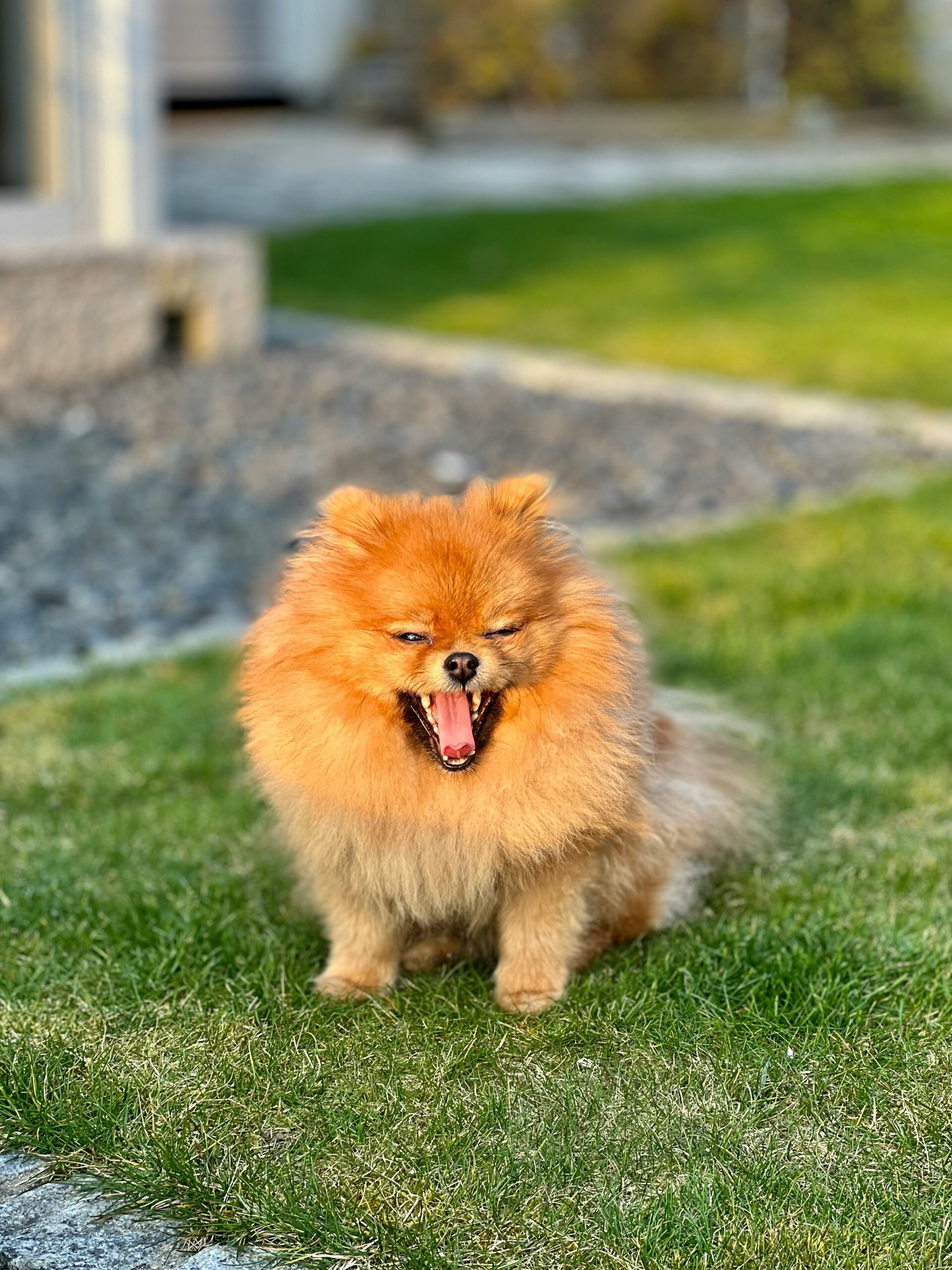Pomeranian Dog Puppies: Everything You Need to Know About These Adorable Companions

Pomeranian puppies are among the most beloved toy dog breeds in the world, known for their fluffy coats, lively personalities, and adorable faces. These little bundles of joy make great companions, but they also come with their own set of unique needs. Whether you’re considering adding a Pomeranian puppy to your family or simply want to learn more about these delightful dogs, this comprehensive guide covers everything you need to know about Pomeranian puppies, including their temperament, care requirements, training tips, and more.
1. A Brief Overview of Pomeranian Puppies
Pomeranians, affectionately known as “Poms,” are a small breed of dog that belongs to the Spitz family. Originating from the Pomerania region in Europe (modern-day Poland and Germany), these dogs were originally much larger and were used as working dogs. Today’s Pomeranians have been bred down in size but retain the same spirited personality and fluffy coat that made them so popular.
Key Characteristics:
- Size: 6-7 inches tall
- Weight: 3-7 pounds
- Life Expectancy: 12-16 years
- Coat: Double coat; thick, fluffy, and comes in various colors including orange, black, white, blue, red, and cream.
2. Temperament and Personality Traits
Pomeranians are known for their bold, curious, and lively personalities. Despite their small size, they have big personalities and are often described as being as brave as a lion. Here are some of the key personality traits of Pomeranian puppies:
2.1. Energetic and Playful
Pomeranians are full of energy and love to play. They enjoy interactive toys, games of fetch, and anything that keeps them mentally stimulated. This playful nature makes them a joy to be around but also means they need regular exercise to burn off their energy.
2.2. Intelligent and Curious
Poms are smart dogs that are eager to learn. They enjoy exploring their surroundings and can be quite inquisitive. This intelligence makes them easy to train, although their stubborn streak can sometimes pose a challenge.
2.3. Affectionate and Loyal
Pomeranians are very affectionate and form strong bonds with their owners. They thrive on attention and love being the center of the family. While they are friendly with family members, they can be reserved or wary of strangers, often acting as a small watchdog.
2.4. Confident and Sometimes Bossy
Don’t let their size fool you—Pomeranians can be quite bossy! They have a lot of confidence and may try to assert themselves, especially if they aren’t given proper boundaries early on.
3. Caring for Your Pomeranian Puppy
Caring for a Pomeranian puppy involves more than just cuddles and playtime. These dogs require regular grooming, a balanced diet, and consistent training to stay happy and healthy. Here’s what you need to know about Pomeranian puppy care:
3.1. Diet and Nutrition
A balanced diet is crucial for your Pomeranian puppy’s growth and overall health. Due to their small size, Pomeranians are prone to obesity, so portion control is important.
- Food Type: Choose high-quality dog food that is formulated for small breeds. Puppy food should be rich in protein to support growth and development.
- Feeding Schedule: Feed your Pomeranian puppy three to four small meals a day. As they grow older, you can reduce this to two meals a day.
- Avoid: Foods high in fillers, artificial preservatives, and table scraps, which can upset their sensitive stomachs.
3.2. Grooming Needs
Pomeranians have a thick double coat that requires regular grooming to prevent mats and tangles. Grooming also helps manage shedding and keeps their coat looking its best.
- Brushing: Brush your Pomeranian at least 2-3 times a week to keep their coat tangle-free. During shedding seasons, daily brushing is recommended.
- Bathing: Bathe your Pomeranian once a month or as needed. Use a mild dog shampoo to avoid skin irritation.
- Nail Trimming: Trim their nails regularly to prevent overgrowth, which can cause discomfort or walking difficulties.
- Teeth Cleaning: Pomeranians are prone to dental issues, so brushing their teeth a few times a week is important.
3.3. Exercise Requirements
Despite their small size, Pomeranians are active dogs that need regular exercise to stay fit and happy.
- Daily Walks: Take your Pomeranian for a short walk daily. They don’t need long runs, but regular outdoor activity helps keep them physically and mentally stimulated.
- Indoor Play: Poms are well-suited for apartment living and can get a lot of exercise indoors. Play fetch, use interactive toys, or set up a small obstacle course.
4. Training Your Pomeranian Puppy
Training your Pomeranian puppy is essential to ensure they grow up to be well-behaved dogs. Due to their intelligence, Poms are quick learners, but their stubborn and independent nature can sometimes make training challenging.
4.1. Potty Training
Potty training a Pomeranian puppy requires patience and consistency.
- Create a Routine: Take your puppy outside frequently, especially after meals, naps, and play sessions.
- Positive Reinforcement: Praise and reward your puppy when they go potty outside. Avoid scolding, as this can create anxiety and setbacks.
- Use Puppy Pads: If you live in an apartment or during bad weather, use puppy pads indoors as a temporary solution.
4.2. Basic Commands
Teaching basic commands like sit, stay, and come will help manage your Pomeranian’s behavior.
- Short Sessions: Pomeranians have short attention spans, so keep training sessions brief but consistent.
- Positive Reinforcement: Use treats, praise, and play to reward your puppy for good behavior. Avoid harsh corrections as Poms are sensitive dogs.
4.3. Socialization
Early socialization is crucial for Pomeranian puppies to prevent shyness or aggression toward other animals and people.
- Expose Them to New Experiences: Introduce your puppy to different environments, people, and other pets. This helps them develop confidence and good social skills.
- Puppy Classes: Enroll in a puppy socialization class to expose your Pomeranian to other dogs in a controlled environment.
5. Common Health Issues in Pomeranian Puppies
Like all breeds, Pomeranians are prone to certain health conditions. Being aware of these issues can help you take preventative measures and seek early treatment.
5.1. Dental Problems
Pomeranians are prone to dental issues due to their small mouths. Regular teeth brushing and dental check-ups are essential.
5.2. Patellar Luxation
This condition, common in small breeds, involves the dislocation of the kneecap. Symptoms include limping or favoring one leg. Surgical intervention may be required in severe cases.
5.3. Tracheal Collapse
This respiratory condition affects the trachea and can cause coughing or difficulty breathing. Manage your Pom’s weight and use a harness instead of a collar to reduce strain on their throat.
5.4. Hypoglycemia
Pomeranian puppies, especially those very small in size, can suffer from low blood sugar. Ensure they eat regular meals and monitor them for signs of lethargy or weakness.
6. Is a Pomeranian Puppy Right for You?
Pomeranian puppies are wonderful companions, but they are not for everyone. Consider the following before bringing a Pom into your home:
- Time and Commitment: Pomeranians require regular grooming, training, and attention. They are not suited to homes where they will be left alone for long periods.
- Living Space: Poms are adaptable and can live in apartments, but they still need daily exercise and mental stimulation.
- Family Dynamics: Pomeranians are great with older children but may not be suitable for very young kids due to their small size and fragility.
7. Conclusion
Pomeranian puppies are delightful pets that bring joy, energy, and companionship to any home. With proper care, training, and attention, your Pomeranian will grow into a loving and loyal member of your family. By understanding their needs and committing to their well-being, you can enjoy many happy years with your adorable Pom.




